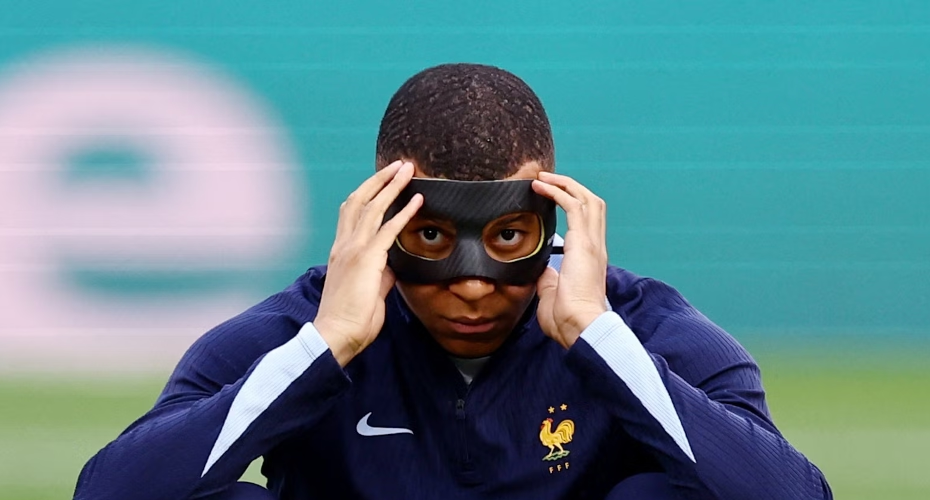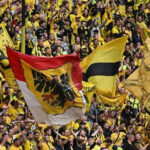For a while, it appeared that the words of Mbappe and Thuram might influence younger voters, particularly those from ethnic minorities who fear a far-right government. However, the impact of any “Mbappe effect” might have been fleeting. Recent polls suggest that the RN has regained a lead.
Many view France as the favourite to win this European Championship, but the possibility of a far-right government taking power at home has left several players in Germany feeling uneasy.
As Mbappe stated, “I don’t want to represent a country that doesn’t align with my values, that doesn’t align with our values.”
When France won the World Cup in 1998, it was celebrated as a victory for multiculturalism. The team included players born in overseas territories (like Lilian Thuram from Guadeloupe and Christian Karembeu from New Caledonia), French-speaking African countries (like Patrick Vieira from Senegal), or who were children of immigrants (like Zinedine Zidane, whose parents came from Algeria in the 1950s, and Thierry Henry, whose parents were from Guadeloupe and Martinique), and others like Youri Djorkaeff and Robert Pires, with Polish-Armenian and Spanish-Portuguese heritage respectively.
The team was affectionately referred to as “black, blanc, beur” (black, white, and Arab) as a play on the “bleu, blanc, rouge” of the French flag. Jacques Chirac, the president at the time, praised a “tricolour and multi-colour team” for creating a “beautiful image of France and its humanity.” However, not everyone was pleased. Jean-Marie Le Pen, leader of the Front National (FN) party, which has since rebranded as the RN under his daughter Marine, dismissed this major national celebration as “only a detail of history.” He had previously claimed it was “a bit artificial to bring players from abroad and call it the French team,” and accused some of not singing or knowing La Marseillaise, the national anthem.
The World Cup victory was seen by some as a pivotal moment for French society. But unity was short-lived.
In April 2002, Jean-Marie Le Pen ran in the presidential election, focusing on anti-immigration measures. He garnered 16.9 percent of the vote in the first round, surpassing Socialist Party leader Lionel Jospin and securing a place alongside Chirac in the decisive second round.
Leading up to the vote, Pires, then playing for Arsenal, warned that “if the extreme right were to win the election, I think more than several (France) players would refuse to take part in the World Cup. We are French, but the team’s roots are from everywhere.” Desailly emphasized the need to “do everything possible to block (Le Pen’s) path to power.”
Chirac won the second round decisively, but Le Pen had established himself as a significant figure in French politics and continued his critiques of the national team’s ethnic composition. During the 2006 World Cup, he said, “France does not fully recognize itself in this team,” and accused coach Raymond Domenech of “perhaps exaggerating the proportion of players of color.”
Lilian Thuram, who earned 142 caps for France from 1994 to 2008, responded by highlighting that “there are Frenchmen who are black, Frenchmen who are white, Frenchmen who are brown.”
“If he has an issue with us, that’s his problem, but we are proud to represent this country,” Thuram added. “So Vive la France — but the true France, not the France that he (Le Pen) envisions.”
Last week, on the tram from Dusseldorf central station to the Merkur-Spiel Arena, France’s supporters were in high spirits, with a rousing rendition of La Marseillaise. The whole carriage — except for a few Austria fans and some journalists — joined in.
Among the supporters were Jean-Luc Rutil, 56, and his daughter, Loanne, 23, who traveled from Paris.
“I personally agree with Mbappe,” Loanne said. “I think it’s right that football players don’t only stick to football. It’s great that they’re talking about politics because politics and the elections affect everybody. He is right to emphasize that it’s important to vote.”
Her father Jean-Luc was less convinced. “I feel the footballers should concentrate on football,” he said. “It’s fine to encourage people to vote, but not to issue directives. We talk about social problems, about racism, but we have been discussing these things since the dawn of time.”
Jean-Luc has followed the French team for decades. He recalls being inspired by the European Championship-winning side of 1984, which included Marius Tresor and Jean Tigana, born in Guadeloupe and Mali, respectively. By 1998 there were Thuram, Desailly, Vieira, Karembeu, Henry, and Zidane, forming a team that — much to Jean-Marie Le Pen’s displeasure — mirrored the multicultural nation France had become.
Loanne said the current team feels representative of modern France: “All walks of life, all colors in our team.”
But does it reflect a nation that, according to the latest polls, is poised to elect a far-right, anti-immigration party as its government?
“The French national team is probably about as popular as it has ever been,” says Tom Williams, author of Va-Va-Voom: The Modern History of French Football. “It’s been a great era — finalists at Euro 2016 on home soil, World Cup winners in 2018, World Cup finalists in 2022.
“But at the same time, we have seen the far right on the rise and a notable increase in racism and racist abuse within French domestic football. This season has witnessed numerous incidents, including Nazi salutes and monkey chants. Bastia had a point deducted after a referee’s assistant was racially abused.
“When things go wrong, the cracks appear, and far-right politicians attempt to exploit it. Every time French football has hit rock bottom since 1998, people have brought race into the conversation.
“It has often been the non-white players who have been singled out. At Euro 2020, the only real disappointment during the recent era, the player who missed the crucial penalty against Switzerland (Mbappe) faced racial abuse on social media — similar to the England players (Marcus Rashford, Jadon Sancho, and Bukayo Saka) who missed their penalties in the final against Italy. This kind of undercurrent is always present.”
The discourse surrounding French politics, race, and the national team has never disappeared. Alain Finkielkraut, a well-known French essayist, wrote in 2005 that the “black, blanc, beur” team had been replaced by one that was “noir, noir, noir” (black, black, black), causing derision across Europe.
In 2011, Mediapart, an online newspaper, published transcripts of a 2010 meeting where French Football Federation (FFF) officials, unaware they were being recorded, discussed limiting non-white youngsters in the football academy system.
Laurent Blanc, the national team coach at the time, was heard saying that some academies “really train the same prototype of players: big, strong, powerful. What are the big, strong, powerful things out there right now? Black people. God knows that in training centers, in football schools, there are many of them.” Blanc added that the FFF should refocus on finding more young players “with our culture, our history, etc.”
An investigation led by the French sports ministry cleared Blanc of discrimination allegations. Francois Blaquart was briefly suspended as national technical director pending an investigation, but he was also cleared and remained with the FFF for another six years.
Blanc, Blaquart, and others felt their words were taken out of context. Chantal Jouanno, the sports minister at the time, said the comments from various FFF officials were “clumsy and uncalled for,” but there was no evidence they had endorsed discriminatory practices.
“It just sort of faded away, but it left a sour taste within French football,” says Williams. “It was a controversy that could have had more significant ramifications.”
Since Jean-Marie Le Pen stepped down in 2011, the nationalist movement has continued to gain support, first under Marine Le Pen and now under 28-year-old Jordan Bardella, who has broadened the RN’s appeal to a younger demographic. While some of its messaging has been softened, the anti-immigration stance remains. So do the tensions with the French national team.
Mbappe didn’t mention any party specifically — and seemed to refer to the NFP coalition as well when speaking of extremism — but his comments were met with anger from the RN.
Bardella told CNews: “When you’re fortunate to have a very, very big salary, when you’re a multi-millionaire, then I’m a little embarrassed to see these athletes (…) give lessons to people who can’t make ends meet, who don’t feel safe, who don’t have the chance to live in neighborhoods protected by security agents.”
A similar sentiment was expressed by RN vice president Sebastien Chenu, who said the French public didn’t want to be “lectured” or “told how to vote” by those “who are disconnected from reality” and “very far removed from their daily concerns.”
But Mbappe’s background is far from privileged. He grew up in the banlieue, the vast urban suburban areas beyond central Paris. So did many of his teammates. To claim they cannot relate to “people who can’t make ends meet” seemed like an easy put-down, but not an accurate one. “The fact that they’re millionaires or multi-millionaires is irrelevant,” says Philippe Marliere, professor of French politics at University College London. “Mbappe comes from Bondy, which is not an affluent suburb. Thuram grew up in a very poor background.
“They are only saying what the majority of players think. Some politicians may say, ‘Footballers should only play football.’ But that’s not the reality. They know that young people admire footballers, that they look up to them. So it’s natural that they are interested in elections and politics. These guys are aware of the debates taking place, of what’s at stake, of what people think.”
One of Mbappe’s sponsors is Dior, the Parisian fashion house, which is offering a “Bondy bag” named after his hometown. He is also an ambassador for the “Premiers de Cordee” charity, which promotes sports and leisure activities for hospitalized children.
When he signed a three-year contract with Paris Saint-Germain in 2022, rejecting offers from Real Madrid, French president Emmanuel Macron praised the “excellent news” and acknowledged his influence, stating that Mbappe could “write the history books of Paris, the club, and the French championship.”
Mbappe’s broader influence in French society should not be underestimated. He’s not just a footballer who can win matches. His voice matters. Just as Zinedine Zidane’s did in 2002, urging voters to “vote for the Republic” against Jean-Marie Le Pen.
Like Zidane, Mbappe has received the Legion d’Honneur, France’s highest order of merit. As did Thuram, who works with UNESCO and the EU to promote education and citizenship, and has become a respected author. His third book, “White Thinking,” examines issues of race and identity, blending autobiography with historical and sociological reflections.
“For many people, sport has changed their lives,” Thuram said in 2018. “I come from a very poor family, so football has been an opportunity to travel and to meet people. And to understand society. Today I write books because I had the chance to meet people who taught me to look at the world differently.
“Sport is an educational tool, a space of liberty. This is why people must be free to say what they think. We often hear that sportsmen and women should stay silent and stick to sport. But this is a reflection of the way we see our society. I often hear people say, ‘I don’t see color, I just see a footballer.’ But that’s part of the problem. We must acknowledge the difficulties faced by many people.”
On Monday, Thuram joined Didier Deschamps’ coaching staff at the France camp in Cologne, participating in the training session at RheinEnergieStadion. Deschamps praised him as “a man with a big heart and someone who, over the years, has used his voice to speak out against injustice.”
Meanwhile, in the media center, politicians from various parties were being asked about Mbappe’s comments. They ranged from dismissive to supportive. Macron, who faces growing scrutiny for failing to address France’s deepening divisions, chose his words carefully: “Kylian is an incredible player and a role model for many. Everyone is free to express their opinions, but we must ensure we do not inflame tensions.”
As for France’s current squad, they have continued to prepare for their semi-final against Germany, focusing on tactics, training, and team spirit. Deschamps and his coaching team have tried to shield them from the political storm brewing back home, emphasizing the importance of unity and concentration.
In the locker room, the atmosphere is a blend of determination and camaraderie. Players are aware of the discussions outside, but their primary focus remains on the pitch. They know they carry the hopes of a nation, and despite the political tensions, they are committed to giving their best performance.
Ultimately, whether or not Mbappe’s words influence the election, the French team remains united in their mission: to represent their country with pride and to strive for victory, both for themselves and for the diverse, multicultural nation they embody.
I don’t want to represent a country that doesn’t align with my values, that doesn’t align with our values.
— Kylian Mbappe









